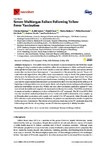Severe Multiorgan Failure Following Yellow Fever Vaccination
Domingo, Cristina
Lamerz, Judith
Cadar, Daniel
Stojkovic, Marija
Eisermann, Philip
Merle, Uta
Nitsche, Andreas
Schnitzler, Paul
Background: The yellow fever (YF) vaccination is recommended by the WHO for peopletraveling or living in endemic areas at risk for yellow fever infections in Africa and South America.Although the live attenuated yellow fever vaccine is a safe and efficient vaccine, rare serious adverseevents after vaccination have been reported. Case presentation: We present the case of a 74-year-oldmale with multiorgan failure after yellow fever vaccination for a trip to Brazil. The patient requiredadmission to the intensive care unit with a prolonged stay due to severe organ dysfunction. Five daysafter the YF vaccination, the patient experienced nausea, vomiting, diarrhea, and general illness. Threedays later he sought medical attention and was transferred to the University Hospital Heidelberg withbeginning multiorgan failure and severe septic shock, including hypotonia, tachypnea, thrombopenia,and acute renal failure the same day. Within one week after vaccination, antibodies against YF viruswere already detectable and progressively increased over the next two weeks. Viral RNA was detectedin serum on the day of admission, with a viral load of 1.0×105copies/mL. The YF virus (YFV) RNAwas also present in tracheal secretions for several weeks and could be detected in urine samples upto 20 weeks after vaccination, with a peak viral load of 1.3×106copies/mL. After 20 weeks in theICU with nine weeks of mechanical ventilation, the patient was transferred to another hospital forfurther recovery. Conclusions: The risk for severe adverse events due to the YF vaccination should bebalanced against the risk of acquiring a severe YF infection, especially in elderly travelers
Dateien zu dieser Publikation

